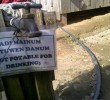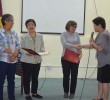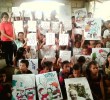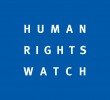The Asian Development Bank will soon release a “consultation draft” on revising its policies that are supposed to protect the environment, the rights of Indigenous Peoples, and those who are resettled against their will as a result of Bank Projects. “This Safeguard Policy Update (SPU) could offer the ADB a critical opportunity to enhance its environment, resettlement and Indigenous Peoples policies in accordance with good international standards, to incorporate lessons from past failures and to put in place and fund dramatically improved safeguard systems for protecting the very people the ADB claims to help through its projects,” said Michael Simon Program Manager of Oxfam Australia.
However, there is a danger that the ADB could instead further dilute the three environmental, involuntary resettlement and indigenous peoples policies if the organization moves towards collapsing the three under one umbrella and further weaken the guidelines to ensure implementation of such “safeguards.” According to Hemantha Withanage of the NGO Forum on the ADB, a Manila-based network of over 300 organizations which monitors the ADB, “We are deeply concerned that the Safeguard Update process is being used by the ADB to lower its social and environmental standards, to move away from internationally accepted norms and bow to pressure from increasingly influential borrowers that see these protective policies as a way to hinder their plans for mega-infrastructure projects in their regions.” Added Withanage, “We say NO to weakened standards and YES to accountability.”
According to Joanna Levitt, Director of Programs at the International Accountability Project, “”An ADB ‘internal desk study’ of 15 projects found that ‘resettlement processes and outcomes are almost uniformly unsatisfactory. We find the same thing to be true in the Highway One Project in Cambodia. The ADB is a public institution with a mandate to promote poverty reduction and sustainable development for the citizens of Asia and the Pacific. If the ADB abandons its responsibility to ensure rigorous social and environmental protections, local people across Asia will be the ones who pay the price.”
“Because of complications in the ADB funded Mae-Moh Coal-fired Plant Project in our district in Thailand, close to 400 people have died due to respiratory illnesses; 80% of the 7000 families in our area suffer from chronic respiratory illnesses. If this can happen under the existing policy regime, I cannot imagine what a further weakening of environmental and social policies will do to people directly affected by ADB projects,” said Maliwan Najwirot, Secretary of the Occupational Health Patients Rights Network of Mae Moh District. ”
“Further weakening of the safeguard policies would be a tremendous step backward for the institutional credibility of the ADB as a public institution whose mandate is to support sustainable development.,” said Stephanie Fried of Environmental Defense, an American organization with over 500,000 members. “Instead of participating in a “race to the bottom” in terms of weakening social and environmental protections, the ADB should cultivate borrowers that welcome the highest international safeguard standards to promote equitable and sustainable development, ” Fried added.
“The ADB mentions free, prior and informed consent of indigenous peoples prior to approving projects, however in our region, consultation is virtually non-existent, much less consent. If any revision of Indigenous Peoples Policy of the ADB hopes to gain legitimacy, this is the first and foremost step the ADB needs to work on.” said Ramananda Wangheirakpam of the North East Peoples Alliance on Trade Finance and Development.
” Aceh is experiencing another disaster as the ADB neglects its own safeguard policies and in the wake of the Tsunami promotes environmentally damaging shrimp aquaculture and a cement factory owned by French company Lafarge without ensuring a thorough environmental assessment and public consultation process,” said Titi Soentoro of NADI, and Indonesia-based NGO.
In a seminar organized by international NGOs held at the ADB Annual General Meeting today, Nessim Ahmad, ADB Director of Environment and Social Safeguards Division, stated � in response to civil society questions — that he could guarantee that the Bank would not weaken existing safeguards and that a proposed move to align Bank practices with borrowing country interests would not represent a move away from internationally recognized environmental, indigenous peoples and resettlement standards. He further added that the revised environmental and social policies would not result in weakened accountability of the ADB towards the projects it funds in spite ADBs interest in allowing borrowing countries to use their own “country systems” of applying environmental and social safeguards.
Shefali Sharma of the Bank Information Center responded, “The ADB is making many commitments towards a consultative process where realities on the ground will be taken into account in this revision process. They are also suggesting that ADB safeguards will not be diluted. However, given the current track record of safeguard implementation, there is deep concern whether ADB will actually meet these promises, both on effective consultation and on allocating enough resources to protect vulnerable people affected by ADB projects.”
Members of the NGO Forum in a collective statement signed by 53 organizations worldwide call on the ADB to:
� Reaffirm the value of safeguard policies and procedures.
* Uphold and ensure compliance with international human rights, labor and environmental laws, conventions and best practice.
* Apply a rights-based approach to the Safeguard Policy Review.
* Ensure that lessons from past failures in safeguard implementation are incorporated in the SPU.
See the NGO Collective Statement and other detailed policy recommendations on the Bank’s Indigenous Peoples, Resettlement and Environment policies developed by the NGO Forum at www.forum-adb.org
Contacts: Hemantha Withanage, NGO Forum on the ADB; Cell: 090 7010 3605
Maliwan Najwirot,Mae Moh District Thailand; C/o Red Constantino Cell: 08015051078
Titi Soentaro, NADI Indonesia; Cell: 08034792334
Michael Simon/Jessica Rosien,; Cell: 080 1444 2863
Stephanie Fried, Senior Scientist, Environmental Defense; cell: 080 3479 2334
****** INBOX is an archive of press releases, statements, announcements, letters to the editors, and manifestos sent to Davao Today for publication. Please email your materials to davaotoday@gmail.com. Davao Today reserves the right to edit or refuse material for publication. *****










